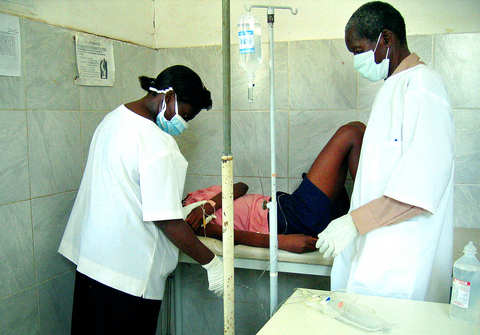Fear stalked the streets on Saturday in this squalid northern Angolan town devastated by years of civil war, now the epicenter of an outbreak of the killer Marburg virus which has claimed 180 lives so far.
In Uige Province alone, some 160 people have been killed by the virus which has claimed 98 percent of those infected in the outbreak, described by the UN as "the worst ever" and "not yet under control."
In Uige town, where fierce fighting between government and rebel troops in Angola's civil war raged until about two years ago, health workers dressed in head-to-toe "Ebola suits" were on their way to pick up a man dying from haemorrhagic fever, as residents struggled to continue with their daily lives under the constant threat of death.

PHOTO: AFP
"We are afraid here all the time," said Octavio Vicente, 25, a Uige resident who works for the UN's World Food Program.
"People are scared here. They are scared to go to the hospital, because that is where everybody got sick," he said at the town's small and run-down airport, which still bears pock-marked bullet holes from the war.
The Ebola-like Marburg virus, whose exact origin is unknown, spreads through contact with bodily fluids such as blood, excrement, vomit, saliva, sweat and tears, but can be contained with relatively simple health precautions, according to experts.
The oubreak has spread to seven of Angola's 18 provinces, and has overtaken an earlier Marburg outbreak in the Democratic Republic of Congo as the largest ever recorded. It was first detected in 1967 when German laboratory workers in Marburg were infected by monkeys from Uganda.
Health workers battling the disease say they have met with heavy resistance from some local communities in Uige.
Normally, custom here dictates that families spend a lot of time with the bodies of the dead before they dispose of the corpse. But that is when the virus is most virulent.
"You can imagine a team coming, taking a child away to the hospital and three days later the family learns that the child is already dead and buried," said Alain Epelboin, French anthropologist of the Paris-based National Center for Scientific Research.
Amada Pedro, 23, a Uige resident, said: "The people say the sick are not animals to be buried like this. The population is revolted and are throwing stones at the teams who are going to pick up the corpses."

Auschwitz survivor Eva Schloss, the stepsister of teenage diarist Anne Frank and a tireless educator about the horrors of the Holocaust, has died. She was 96. The Anne Frank Trust UK, of which Schloss was honorary president, said she died on Saturday in London, where she lived. Britain’s King Charles III said he was “privileged and proud” to have known Schloss, who cofounded the charitable trust to help young people challenge prejudice. “The horrors that she endured as a young woman are impossible to comprehend and yet she devoted the rest of her life to overcoming hatred and prejudice, promoting kindness, courage, understanding

US President Donald Trump on Friday said Washington was “locked and loaded” to respond if Iran killed protesters, prompting Tehran to warn that intervention would destabilize the region. Protesters and security forces on Thursday clashed in several Iranian cities, with six people reported killed, the first deaths since the unrest escalated. Shopkeepers in Tehran on Sunday last week went on strike over high prices and economic stagnation, actions that have since spread into a protest movement that has swept into other parts of the country. If Iran “violently kills peaceful protesters, which is their custom, the United States of America will come to

‘DISRESPECTFUL’: Katie Miller, the wife of Trump’s most influential adviser, drew ire by posting an image of Greenland in the colors of the US flag, captioning it ‘SOON’ US President Donald Trump on Sunday doubled down on his claim that Greenland should become part of the US, despite calls by the Danish prime minister to stop “threatening” the territory. Washington’s military intervention in Venezuela has reignited fears for Greenland, which Trump has repeatedly said he wants to annex, given its strategic location in the arctic. While aboard Air Force One en route to Washington, Trump reiterated the goal. “We need Greenland from the standpoint of national security, and Denmark is not going to be able to do it,” he said in response to a reporter’s question. “We’ll worry about Greenland in

PERILOUS JOURNEY: Over just a matter of days last month, about 1,600 Afghans who were at risk of perishing due to the cold weather were rescued in the mountains Habibullah set off from his home in western Afghanistan determined to find work in Iran, only for the 15-year-old to freeze to death while walking across the mountainous frontier. “He was forced to go, to bring food for the family,” his mother, Mah Jan, said at her mud home in Ghunjan village. “We have no food to eat, we have no clothes to wear. The house in which I live has no electricity, no water. I have no proper window, nothing to burn for heating,” she added, clutching a photograph of her son. Habibullah was one of at least 18 migrants who died